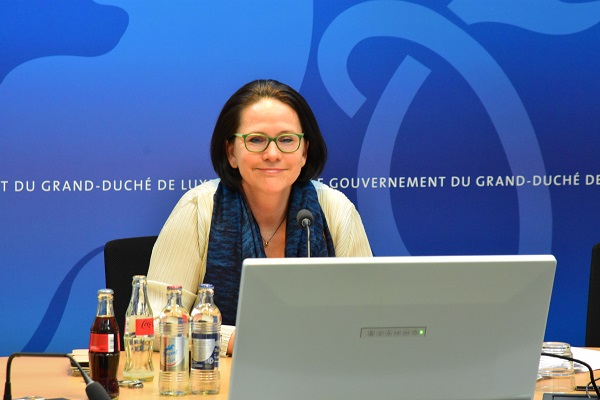 Yuriko Backes, Luxembourg's Minister of Finance;
Credit: MFIN
Yuriko Backes, Luxembourg's Minister of Finance;
Credit: MFIN
On Monday 30 January 2023, Luxembourg's Minister of Finance, Yuriko Backes, presented the financial situation of the State as of 31 December 2022 at a joint meeting of the Finance and Budget Committee and the Budget Implementation Committee of the Chamber of Deputies (Luxembourg's parliament).
The Ministry of Finance stressed that the financial situation, which was in surplus at the end of December 2022, should not be confused with the final situation which will be in deficit, as some major expenditures will still be made in the 2022 budget year during the so-called supplementary period, which runs until 30 April 2023.
"In anticipation of the expenditure in the supplementary period and despite the economic and geopolitical headwinds, I am pleased with this interim result as of 31 December 2022, which shows the resilience of our country's public finances," Minister Backes commented. "I will propose targeted tax relief in the form of tax credits if the improvement over previous estimates is confirmed. This is in line with the commitment I made when presenting the 2023 budget."
As of 31 December 2022, central government revenue amounted to €23.5 billion, which represents an increase of 7.4% compared to 31 December 2021.
More specifically, the Luxembourg Inland Revenue (Administration des contributions directes - ACD) collected revenues of €11.1 billion, i.e. 109.4% of the voted budget, which represents an increase of €834 million (+8%) compared to 31 December 2021. The ministry has attributed this positive evolution mainly to the withholding tax on wages and salaries, the revenue of which increased by €546 million (+11%), owing to the good performance of the labour market and the successive wage indexation tranches. At the same time, the deficit due to the granting of the energy tax credit to households now amounts to €267 million.
The revenues of the Customs and Excise Agency (Administration des douanes et accises - ADA) amounted to €1.9 billion as of 31 December 2022, i.e. 99.5% of the voted budget. Compared with 2021, revenue increased by €15 million (+0.8%). The direct and indirect effects of the excise duty reductions applied in Luxembourg and neighbouring countries led to a difficult year for fuel sales, albeit, according to the ministry, with the positive effect of reducing Luxembourg's carbon footprint. Tax revenues suffered as a result: revenues from road diesel fell from €690 million in 2021 to €572 million in 2022, i.e. a decrease of 17.1%.
The revenues collected by the Registration Duties, Estates and VAT Authority (Administration de l'enregistrement, des domaines et de la TVA - AED) amounted to €7.3 billion as of 31 December 2022, which represents an increase of €617 million (+9%). The ministry has attributed the aforementioned evolution mainly to VAT, the revenues of which increased by €560 million (+12%) and for which high inflation is a determining factor. Revenue from the subscription tax remained well below budget forecasts as a result of the situation on the financial markets. The ministry made the same observation for registration fees, given the state of the real estate market in Luxembourg.
Central government expenses amounted to €22.5 billion as of 31 December 2022, i.e. an increase of 6.9% compared to 2021. This increase, which is comparable to that of revenues, is explained in part by the implementation of subsidies for households and businesses (Energiedësch; Solidaritéitspak 1 and 2.0) under which some €413 million (including the energy tax credit) were disbursed in 2022. Expenditure was also affected by indexation tranches and high inflation, especially in the area of operating costs and wages payable by the State, which rose by 9% and 9.2% respectively during the first twelve months of the 2022 budget year, which does not end until 30 April 2023. At the same time, public investment has been maintained at a high level, amounting to €2.54 billion.
Combined, revenue and expenditure show a surplus central government balance of €1.01 billion as of 31 December 2022. While revenues for the 2022 financial year have been almost fully received, expenditure of up to €1.8 billion will potentially be incurred in the supplementary period, which would ultimately result in a deficit situation for the central government for the entire year.
Considering the latest developments and updated information provided by the various ministries and administrations, the final central government balance in 2022 is expected to be in deficit, but to improve by at least €500 million compared to the estimate presented in October 2022. The ministry confirmed that the related analysis would be further refined and its structural implications (i.e. the possible impact of this improvement on subsequent budget years) will be further elaborated in the coming weeks, particularly with a view to the preparation of the Stability and Growth Programme to be presented by Minister Backes at the end of April.
Lastly, the ministry noted that public debt as of 31 December 2022 amounted to €18.9 billion, or 24.0% of GDP, which is also slightly lower than the estimate of 24.6% of GDP used in the 2023 budget presentation.
Minister Backes explained: "Given the geopolitical outlook, and in particular the expected economic slowdown in 2023, I remain committed to a responsible and forward-looking fiscal policy that does not compromise the medium-term sustainability of our public finances. In this regard, I will continue to closely monitor the evolution of public finances in order to determine the margin available for targeted tax relief, while respecting the trajectory set out in the 2023 budget. I would like this margin to be fully used to strengthen the purchasing power of households in these difficult times, retroactively from the beginning of 2023."








